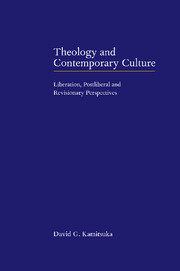Book contents
- Frontmatter
- Contents
- Acknowledgments
- Introduction
- 1 Values informing conceptions of theology
- 2 Apologetics and the linguistic-historical turn
- 3 Credibility in the pluralistic public realm
- 4 Reading the Bible theologically as the church's book
- 5 Pursuing doctrinal common ground
- 6 Virtues and vices in theological practice
- Select bibliography
- Index
4 - Reading the Bible theologically as the church's book
Published online by Cambridge University Press: 29 September 2009
- Frontmatter
- Contents
- Acknowledgments
- Introduction
- 1 Values informing conceptions of theology
- 2 Apologetics and the linguistic-historical turn
- 3 Credibility in the pluralistic public realm
- 4 Reading the Bible theologically as the church's book
- 5 Pursuing doctrinal common ground
- 6 Virtues and vices in theological practice
- Select bibliography
- Index
Summary
The theologians from the movements I am examining all view Christian theology as involving a complex process of reading and using the Bible as the church's book – that is, as scripture – in theological practice. Entailed in any theological use of scripture is the theologian's decision about how to relate scripture to the church's ongoing ecumenical tradition. Coming to terms with the scripture–tradition relationship is a daunting task in light of the diversity of Christian intracommunal and intercommunal reading practices and the challenges to text-based religion by contemporary modes of thought. New scripture readings from communities on Christianity's margins are seriously competing with traditional ways of reading the Bible, and this presents a dilemma for how theologically to adjudicate among this plurality of readings new and old. In academia, poststructuralism joins the list of other scholarly theories which challenge all of these ecclesial readings. Deconstructive criticism especially has serious implications if it erodes the church's ability to use scripture as a privileged source and norm for community-building and Christian praxis.
The very notion of the church's “book” has come under “a/theological” fire, for example, from deconstructive theologian Mark C. Taylor. According to Taylor, the time has passed for privileging any book viewed as a logocentric, self-enclosed unity, such as the canonically closed book of Christianity. We live in a “liminal” moment, not only in the shadow of the death of God but the death of selves. A/theology does not try to avoid but to enter (or more precisely, “wander”) into this deconstructive place in order to find “a new opening for the religious imagination.”
- Type
- Chapter
- Information
- Theology and Contemporary CultureLiberation, Postliberal and Revisionary Perspectives, pp. 109 - 147Publisher: Cambridge University PressPrint publication year: 1999



